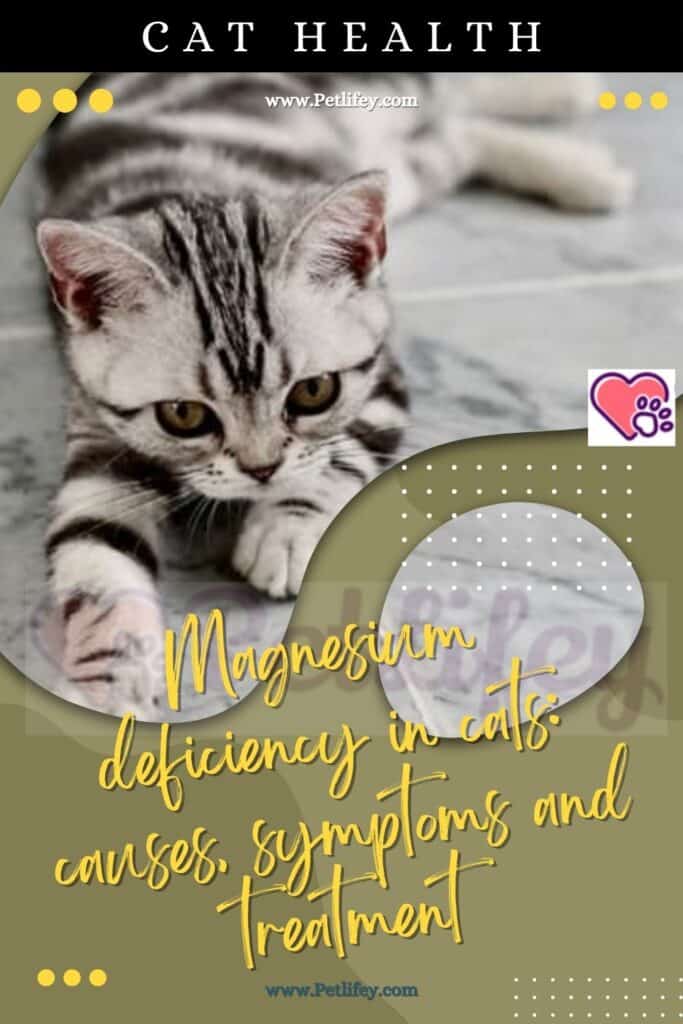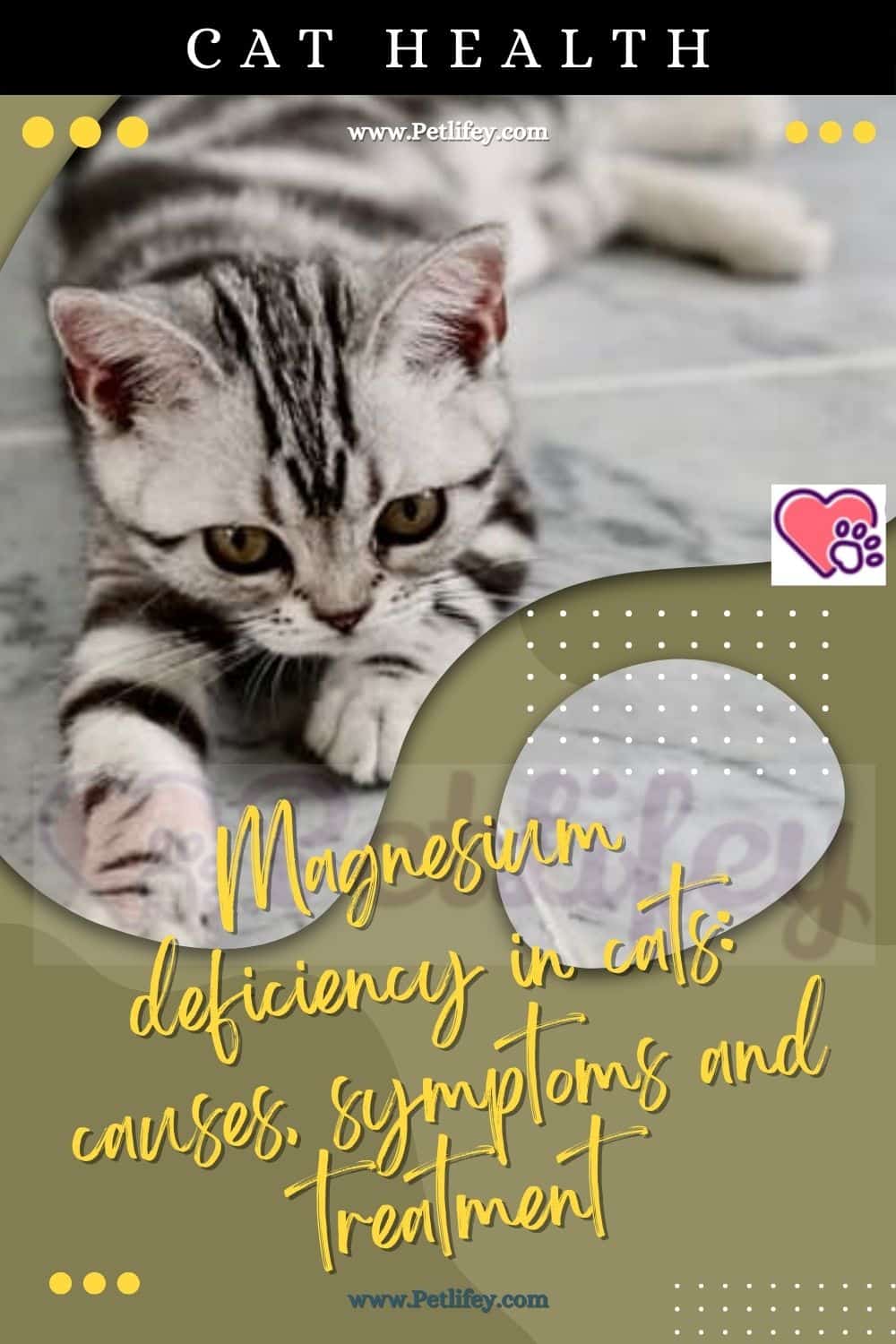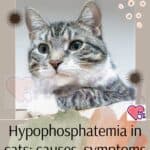Magnesium Deficiency in Cats: Understanding Causes, Recognizing Symptoms, and Exploring Treatments

Magnesium plays a vital role in your cat’s overall health, influencing nerve function, muscle movement, and the regulation of many biochemical reactions in the body. When your cat suffers from a magnesium deficiency, the consequences can affect various aspects of their well-being, from their heart rhythm to their bone strength. Identifying the signs of this deficiency is crucial for maintaining your cat’s health and requires an understanding of the associated symptoms and causes.
In your feline companion, signs of magnesium deficiency can manifest as muscle weakness, irregular heartbeats, or even sudden lameness. These symptoms can also be accompanied by urinary tract issues since magnesium is integral to urinary health. Behavioral changes such as depression may also hint at a possible deficiency. The causes can vary, ranging from dietary imbalances to underlying health conditions that impair magnesium absorption or increase its excretion.
Addressing magnesium deficiency requires pinpointing the underlying cause and tailoring the treatment accordingly. This may involve dietary adjustments, supplementation, or addressing specific health issues contributing to the imbalance. Prompt and tailored interventions can prevent further complications, helping to restore your cat’s health and vitality.
Understanding Magnesium Deficiency
Magnesium is a vital mineral for your cat’s overall health, influencing several bodily functions. A deficiency may lead to serious health issues, making early detection and management crucial.
Role of Magnesium in Feline Health
Magnesium plays an indispensable role in your cat’s body. It’s an electrolyte that is critical for maintaining electrolyte balance within cells, especially intracellular environments. This mineral is essential for proper skeletal muscle, liver, kidneys, and soft tissue function. It contributes to the structure of bone and is involved in over 300 enzyme systems that regulate various metabolic functions including the production of energy and maintenance of electrical balance. Magnesium also helps with the synthesis of acetylcholine, a neurotransmitter necessary for muscle function, and prevents cardiac abnormalities by supporting normal heart rhythms.
Common Causes of Magnesium Deficiency
Several factors can cause magnesium deficiency in your cat:
- Decreased Intake: Inadequate dietary magnesium, often due to low-quality cat food, can lead to deficiency.
- Malabsorption: Conditions that interfere with nutrient absorption, such as intestinal diseases or genetic abnormalities, can prevent proper magnesium uptake.
- Excessive Loss: Certain conditions like diabetes, hyperthyroidism, or use of diuretics can lead to increased magnesium loss.
- Severe Malnutrition: It encompasses both inadequate dietary intake and malabsorption, leading to deficiency.
Understanding these causes is vital for preventing and treating magnesium deficiency, safeguarding your cat’s health and well-being.
Identifying Magnesium Deficiency
When your cat exhibits unusual physical symptoms or behavior, it could signal a magnesium deficiency. Recognizing this condition early is crucial for effective treatment.
Signs and Symptoms
Your cat may display weakness and lethargy as clear indicators of magnesium deficiency. Look for observable signs such as depression, muscle trembling, and severe muscle pain. This deficiency may also cause behavioral changes, including irritability or anxiety. In severe cases, ataxia (lack of coordination), tetany (muscle cramps and spasms), convulsions, or even seizures can occur. Noticeable overactive reflexes might also be a symptom worth your attention.
Diagnosis and Testing
The diagnosis of magnesium deficiency begins with a physical examination by a veterinarian. If deficiency is suspected, specific tests such as a blood test to measure levels of ionized magnesium and intracellular magnesium, alongside a urinalysis, are conducted. These tests help distinguish between a true deficiency and other conditions with similar clinical signs. An ECG may be performed to identify any arrhythmias, which can be associated with low magnesium levels. These diagnostic tools are essential to confirm magnesium deficiency and exclude other underlying health issues.
Treatment and Management
Effective treatment and management of magnesium deficiency in cats revolve primarily around two critical areas: dietary adjustments and medical interventions, tailored to address the individual needs of your cat and to restore their magnesium levels to a healthy balance.
Dietary Adjustments
When managing magnesium deficiency, it’s essential to provide your cat with nutritionally balanced cat food that is rich in essential nutrients. Aim for a diet that includes:
- Protein: High-quality sources like salmon and beef are valuable, as they provide a complete amino acid profile.
- Fat: The inclusion of omega fatty acids is crucial for overall health.
- Fiber: Foods with pumpkin or oatmeal can promote digestive health.
- Magnesium: Incorporate foods that naturally contain magnesium. Be cautious of excess phosphorous, which can hinder magnesium absorption.
- Vitamins and Minerals: Ensure the presence of folate from sources like spinach to support cellular functions.
It is important to avoid over-the-counter supplements unless explicitly advised by a veterinarian, as improper supplementation can lead to other health issues.
Medical Interventions
Medical treatment for severe cases of hypomagnesaemia may involve:
- Magnesium Infusion: Administering magnesium via intravenous fluids under close veterinary supervision.
- Medications: Prescription medications, such as insulin in diabetic cats or digoxin for those with concurrent cardiac issues, might be necessary.
- Dialysis: In cases associated with kidney failure to aid in correcting electrolyte imbalances.
Always consult your veterinarian for precise treatment options as they will take into account your cat’s entire health history, including any concurrent diseases like kidney failure, that may be affected by or contribute to magnesium levels. They might also adjust any ongoing treatments, such as those involving cisplatin or other medications that could influence magnesium absorption or retention.
Preventing Recurrences
Preventing recurrences of magnesium deficiency in your cat involves maintaining a balanced diet and regular health check-ups to monitor electrolyte levels.
Long-Term Nutritional Strategies
Cats, as obligate carnivores, require a nutritionally balanced diet rich in vitamins and minerals. To prevent hypomagnesemia and associated issues like hypokalemia, hypocalcemia, and hypophosphatemia:
- Ensure that your cat’s diet includes appropriate amounts of magnesium, calcium, potassium, vitamins, and iron.
- Choose high-quality cat food brands that meet the nutritional needs of your cat. Consult with a veterinarian to understand the specific dietary requirements based on your cat’s health, age, and lifestyle.
- Avoid or limit foods with high phosphorus content, as they can decrease magnesium absorption.
Regular Health Monitoring
Scheduling regular health checks is crucial for early detection of electrolyte abnormalities that can lead to cardiovascular problems.
- A comprehensive physical examination and blood test should be conducted annually.
- Monitor your cat’s electrolytes, particularly magnesium, potassium, and calcium levels.
- If your cat has had a history of magnesium deficiency, more frequent monitoring may be necessary to keep track of their electrolyte levels and adjust their diet or supplements accordingly.
Special Considerations for Specific Cat Populations
Your cat’s risk for magnesium deficiency can be influenced by factors like breed, age, and existing health conditions. These considerations are important for understanding and managing this deficiency effectively.
Breed Predispositions and Genetics
Certain cat breeds may have a genetic predisposition to conditions that can affect magnesium absorption. For example, Persian and Himalayan breeds can be more prone to kidney stones, which can impact magnesium levels. It’s essential for you to understand your cat’s breed-specific risks and discuss these with your veterinarian to ensure that potential magnesium-related health issues are monitored closely.
Age-Related Factors
Young kittens and senior cats can be particularly vulnerable to magnesium deficiency. Kittens in rapid development stages require adequate magnesium for growth, and a deficiency could lead to stunted growth. On the other hand, older cats often face an array of age-related issues such as kidney failure or decreased intestinal absorption, which can contribute to lower magnesium levels. Regular veterinary check-ups can aid in early detection and treatment of these conditions.
Impacts of Concurrent Diseases
If your cat is experiencing concurrent diseases like diabetes mellitus, kidney failure, liver disease, or intestinal disease, these disorders can interfere with the body’s ability to maintain sufficient magnesium levels. Diabetes mellitus, for instance, often leads to increased urine output, which may result in excessive loss of magnesium. In case of symptoms such as lethargy or irregular heartbeat, it’s crucial for you to seek veterinary care, as these could be signs of magnesium deficiency exacerbating underlying health issues.
Conclusion
When caring for your cat, it’s important to be aware that magnesium plays a vital role in their overall health. A deficiency in magnesium can lead to a range of health issues. Be mindful of the following key points:
- Symptoms: Watch for signs of urinary tract problems, muscle weakness, or changes in behavior. These may indicate a magnesium deficiency.
- Diet: Ensure your cat’s diet is balanced and meets their nutritional needs, including adequate magnesium levels.
- Veterinary Care: Seek prompt veterinary attention if you suspect a deficiency, as early diagnosis and treatment are crucial.
Treatment strategies may include:
- Dietary Adjustments: Providing a magnesium-rich diet or supplements as recommended by your vet.
- Medical Management: Addressing underlying conditions that may be causing the deficiency.
- Monitoring: Regular check-ups to monitor your cat’s magnesium levels and overall health.
Remember, your proactive approach can make a significant difference in the management and prevention of magnesium deficiency in your cat. Stay informed and consult with your veterinarian for tailored advice and treatment plans for your feline friend.







